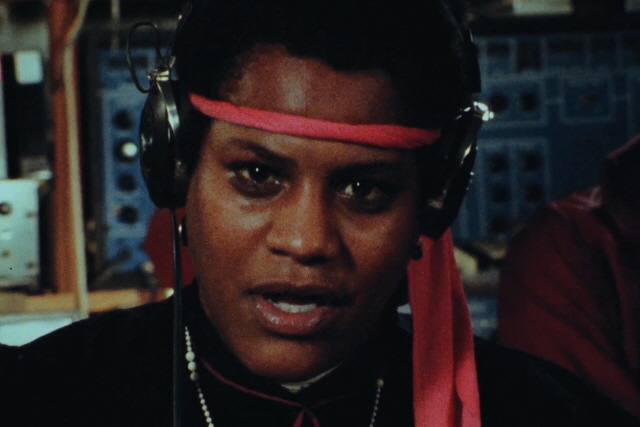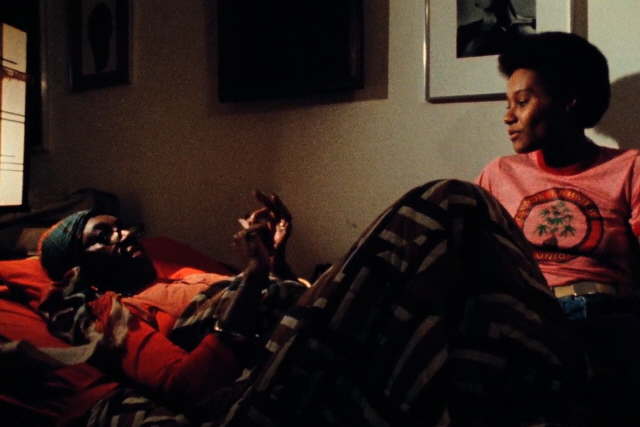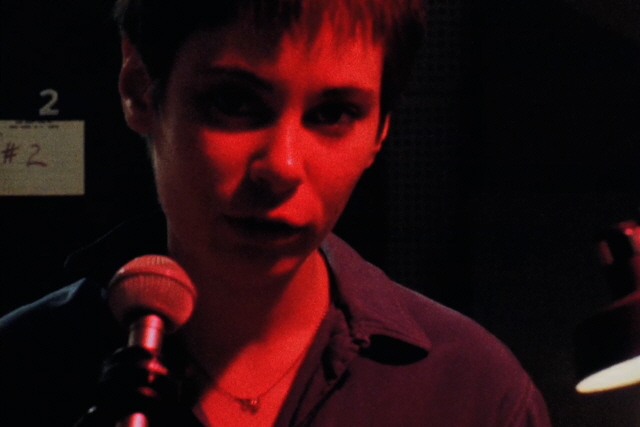19th(2017)
Born in Flames
Lizzie BORDEN
- USA
- 1983
- 80min
- Blu-ray
- color
- Fiction
SYNOPSIS
"Preserved by Anthology Film Archives with restoration funding by The Hollywood Foreign Press Association and The Film Foundation."
New York; ten years after the most peaceful revolution that the world has ever seen. The governing Socialist party is emphasizing the need for unity on the slow road to reform. However, discontent is surfacing, particularly from the women\'s groups. Vigilante groups are formed to combat the rise in street violence and rape. The Women\'s Army rally support in their protest against the loss of women\'s jobs. The urgent need for widespread publicity about these and other issues drive the Women\'s Army to approach two underground radio stations. Increased surveillance and arrests bring the, often fragmented, women\'s groups together to work towards a common goal as events move towards an explosive climax.
Born in Flames is a feminist ‘guerrilla cinema’ as Teresa de Lauretis once called, and might be probably the most radical independent film in the independent film history in the USA during the 1980s. This film is an SF piece set in a decade later when the revolution is achieved, and a socialist government gains its power over the USA. On the streets and subways of post-revolution New York, sexual harassments and unprovoked and random acts of violence toward women become one of the another casual things, and indecent jobs and precarious works are passed along to women, colored people and minorities. The reproductive labor of upbringing and house chore are taken for granted as unrecognized labors of women which are beyond any social acknowledgement. While women’s belief in the future is in gradual encroachment, the murder of Adelaide Norris, a radical Afro-American lesbian feminist who tried to organize the Women’s Army, is taken place by FBI. Feminists gathering from all different backgrounds, including journalists, politicians, women’s rights’ activists, DJ of pirate radio station, etc. form the Women’s Army to resist statist conspiracy to cover up Adelaide’s murder as a suicide, and carry an act of terror to blow up the broadcast antennas installed on the world trade center.
Even after the socialist revolution, patriarch still functions and the patriarchal ideological state apparatus remains the same. This film brings lots of contrasting images and techniques to visualize this rather gigantic argument: discrepancy between sounds and images, intercut editing between broadcast image and reality, one-scene one-shot shootings, contrasts between fixed camera and hand-held camera, etc. This film’s intense, fast-paced, and direct form requires female audiences’ action in immediacy, and not in the future. Various genres of music--such as punk, rock, jazz, hiphop, reggae, etc.—are equated with women embodying various differences of sexualities, races, classes, etc. Feminism is the ‘flames’ to cross and to incinerate all these differences. A classical film to pound every feminist’s hearts. (KIM Sunah)
New York; ten years after the most peaceful revolution that the world has ever seen. The governing Socialist party is emphasizing the need for unity on the slow road to reform. However, discontent is surfacing, particularly from the women\'s groups. Vigilante groups are formed to combat the rise in street violence and rape. The Women\'s Army rally support in their protest against the loss of women\'s jobs. The urgent need for widespread publicity about these and other issues drive the Women\'s Army to approach two underground radio stations. Increased surveillance and arrests bring the, often fragmented, women\'s groups together to work towards a common goal as events move towards an explosive climax.
Born in Flames is a feminist ‘guerrilla cinema’ as Teresa de Lauretis once called, and might be probably the most radical independent film in the independent film history in the USA during the 1980s. This film is an SF piece set in a decade later when the revolution is achieved, and a socialist government gains its power over the USA. On the streets and subways of post-revolution New York, sexual harassments and unprovoked and random acts of violence toward women become one of the another casual things, and indecent jobs and precarious works are passed along to women, colored people and minorities. The reproductive labor of upbringing and house chore are taken for granted as unrecognized labors of women which are beyond any social acknowledgement. While women’s belief in the future is in gradual encroachment, the murder of Adelaide Norris, a radical Afro-American lesbian feminist who tried to organize the Women’s Army, is taken place by FBI. Feminists gathering from all different backgrounds, including journalists, politicians, women’s rights’ activists, DJ of pirate radio station, etc. form the Women’s Army to resist statist conspiracy to cover up Adelaide’s murder as a suicide, and carry an act of terror to blow up the broadcast antennas installed on the world trade center.
Even after the socialist revolution, patriarch still functions and the patriarchal ideological state apparatus remains the same. This film brings lots of contrasting images and techniques to visualize this rather gigantic argument: discrepancy between sounds and images, intercut editing between broadcast image and reality, one-scene one-shot shootings, contrasts between fixed camera and hand-held camera, etc. This film’s intense, fast-paced, and direct form requires female audiences’ action in immediacy, and not in the future. Various genres of music--such as punk, rock, jazz, hiphop, reggae, etc.—are equated with women embodying various differences of sexualities, races, classes, etc. Feminism is the ‘flames’ to cross and to incinerate all these differences. A classical film to pound every feminist’s hearts. (KIM Sunah)
PROGRAM NOTE
\"Preserved by Anthology Film Archives with restoration funding by The Hollywood Foreign Press Association and The Film Foundation.\"
SYNOPSIS
New York; ten years after the most peaceful revolution that the world has ever seen. The governing Socialist party is emphasizing the need for unity on the slow road to reform. However, discontent is surfacing, particularly from the women\'s groups. Vigilante groups are formed to combat the rise in street violence and rape. The Women\'s Army rally support in their protest against the loss of women\'s jobs. The urgent need for widespread publicity about these and other issues drive the Women\'s Army to approach two underground radio stations. Increased surveillance and arrests bring the, often fragmented, women\'s groups together to work towards a common goal as events move towards an explosive climax.
PROGRAM NOTE
Born in Flames is a feminist ‘guerrilla cinema’ as Teresa de Lauretis once called, and might be probably the most radical independent film in the independent film history in the USA during the 1980s. This film is an SF piece set in a decade later when the revolution is achieved, and a socialist government gains its power over the USA. On the streets and subways of post-revolution New York, sexual harassments and unprovoked and random acts of violence toward women become one of the another casual things, and indecent jobs and precarious works are passed along to women, colored people and minorities. The reproductive labor of upbringing and house chore are taken for granted as unrecognized labors of women which are beyond any social acknowledgement. While women’s belief in the future is in gradual encroachment, the murder of Adelaide Norris, a radical Afro-American lesbian feminist who tried to organize the Women’s Army, is taken place by FBI. Feminists gathering from all different backgrounds, including journalists, politicians, women’s rights’ activists, DJ of pirate radio station, etc. form the Women’s Army to resist statist conspiracy to cover up Adelaide’s murder as a suicide, and carry an act of terror to blow up the broadcast antennas installed on the world trade center.
Even after the socialist revolution, patriarch still functions and the patriarchal ideological state apparatus remains the same. This film brings lots of contrasting images and techniques to visualize this rather gigantic argument: discrepancy between sounds and images, intercut editing between broadcast image and reality, one-scene one-shot shootings, contrasts between fixed camera and hand-held camera, etc. This film’s intense, fast-paced, and direct form requires female audiences’ action in immediacy, and not in the future. Various genres of music--such as punk, rock, jazz, hiphop, reggae, etc.—are equated with women embodying various differences of sexualities, races, classes, etc. Feminism is the ‘flames’ to cross and to incinerate all these differences. A classical film to pound every feminist’s hearts. (KIM Sunah)
SYNOPSIS
New York; ten years after the most peaceful revolution that the world has ever seen. The governing Socialist party is emphasizing the need for unity on the slow road to reform. However, discontent is surfacing, particularly from the women\'s groups. Vigilante groups are formed to combat the rise in street violence and rape. The Women\'s Army rally support in their protest against the loss of women\'s jobs. The urgent need for widespread publicity about these and other issues drive the Women\'s Army to approach two underground radio stations. Increased surveillance and arrests bring the, often fragmented, women\'s groups together to work towards a common goal as events move towards an explosive climax.
PROGRAM NOTE
Born in Flames is a feminist ‘guerrilla cinema’ as Teresa de Lauretis once called, and might be probably the most radical independent film in the independent film history in the USA during the 1980s. This film is an SF piece set in a decade later when the revolution is achieved, and a socialist government gains its power over the USA. On the streets and subways of post-revolution New York, sexual harassments and unprovoked and random acts of violence toward women become one of the another casual things, and indecent jobs and precarious works are passed along to women, colored people and minorities. The reproductive labor of upbringing and house chore are taken for granted as unrecognized labors of women which are beyond any social acknowledgement. While women’s belief in the future is in gradual encroachment, the murder of Adelaide Norris, a radical Afro-American lesbian feminist who tried to organize the Women’s Army, is taken place by FBI. Feminists gathering from all different backgrounds, including journalists, politicians, women’s rights’ activists, DJ of pirate radio station, etc. form the Women’s Army to resist statist conspiracy to cover up Adelaide’s murder as a suicide, and carry an act of terror to blow up the broadcast antennas installed on the world trade center.
Even after the socialist revolution, patriarch still functions and the patriarchal ideological state apparatus remains the same. This film brings lots of contrasting images and techniques to visualize this rather gigantic argument: discrepancy between sounds and images, intercut editing between broadcast image and reality, one-scene one-shot shootings, contrasts between fixed camera and hand-held camera, etc. This film’s intense, fast-paced, and direct form requires female audiences’ action in immediacy, and not in the future. Various genres of music--such as punk, rock, jazz, hiphop, reggae, etc.—are equated with women embodying various differences of sexualities, races, classes, etc. Feminism is the ‘flames’ to cross and to incinerate all these differences. A classical film to pound every feminist’s hearts. (KIM Sunah)
Director
-

Lizzie BORDENLizzie BORDEN
She has created a small but explosive body of work that challenges viewers to rethink their assumptions about gender, sexuality, race, and class. She began her filmmaking career by creating the soundtrack for Richard SERRA’s documentary, Steelmill. Her first feature was Regrouping, about a woman’s consciousness-raising group. The homogeneity of race and class in the group led her to embark on Born in Flames, while her interest in the sex industry and labor resulted in Working Girls, an un-romanticized look at a middle-class brothel in Manhattan.
Credit
- ProducerLizzie BORDEN
- Screenwriter Lizzie BORDEN
- Cinematography Ed BOWES, Al SANTANA
- Editor Lizzie BORDEN




